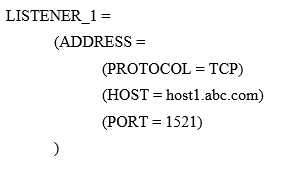In the spfile of a single instance database, LOCAL_LISTENER is set to LISTENER_1.
The TNSNAMES.ORA file in $ORACLE_HOME/network/admin in the database home contains:

Which statement is true?
In the spfile of a single instance database, LOCAL_LISTENER is set to LISTENER_1.
The TNSNAMES.ORA file in $ORACLE_HOME/network/admin in the database home contains:

Which statement is true?
The LREG process dynamically registers services with the listener specified by the LOCAL_LISTENER parameter. Dynamic service registration does not require manual configuration in the listener.ora file. Instead, it relies on the local_listener parameter and the corresponding address in the TNSNAMES.ORA file. Hence, the correct explanation aligns with how dynamic service registration is intended to work without additional manual configurations in the listener.ora file.
Answer is B.
I would agree Dynamic service registration does not require any manual configuration in the listener.ora file.
I disagree: the manual configuration to which the documentation refers is intended to be "configuration [relative to dynamic registration]". But the listener has to be defined in the listener.ora nonetheless, as stated in the same document: "Synchronization occurs when the protocol address of the listener is specified in the listener.ora file and the location of the listener is specified in the initialization parameter file."
Answer is B. The listener forwards client requests to supported services. These services are dynamically registered with the listener. This dynamic registration feature is called service registration. The registration is performed by the Listener Registration (LREG) process. Dynamic service registration does not require any manual configuration in the listener.ora file. Reference: https://docs.oracle.com/database/121/NETAG/listenercfg.htm#NETAG292
You DO need to define the listener in the listener.ora file if you're using an alias, however you don't define the instances registered in the _SID_LIST argument.
Exactly, if the listener specified as local_listener is not configured, the service cannot be registered there.
My vote is for answer B, because it's the closest to my findings. The question text does not imply the listener name is LISTENER_1. The string "LISTENER_1" is just an alias, that does not need a record in listener.ora, just a setting of LOCAL_LISTENER parameter in the database and alias explanation in tnsnames.ora as described at https://docs.oracle.com/en/database/oracle/oracle-database/19/netag/configuring-and-administering-oracle-net-listener.html#GUID-0E7C39E3-4627-403A-AE69-E9AA2C7E4C57 When reproduced a scenario on a testing instance and typing $ lsnrctl status LISTENER_1, I can see status of default LISTENER with services registered dynamicaly after database was bounced. In listener.ora there is a definition of standard LISTENER, but no mention about LISTENER_1, however dynamic service registration works fine.
Try creating a new PDB without you not specifying the LISTENER_1 on the listener.ora, you will not see any service registered for that PDB. Its a Rule: To get Dynamic Service Registration on user created listeners, you must: a. configure the LISTENER_1 on tnsname.ora b. configure the LISTENER_1 on listener.ora c. set or append the LISTENER_1 to the LOCAL_LISTENER parameter
The answer is C. I validated this practically, this also came in exam and have passed the exam with high percentage. There were no mention of this being a problem.
sorry not C. D. There are two listeners named LISTENER and LISTENER_1 running simultaneously using port 1521 on the same host as the database instances
It's not possible to have 2 processes listening on the same port - just the last one can listen. In this particular scenario you only have one listener LISTENER and the alias LISTENER_1 for the same process.
Hi, I think the correct is C. I did the test with configuration about this question: If you want the LREG do the dynamic service registration with LISTENER_1, you have to set both tnsnames.ora to resolve the address/port and listener.ora with LISTENER_1 address/port. In another case the database do the dynamic register with default LISTENER on default port 1521 regardless local_listener parameter configuration. Take account the question ask about dynamic service register with LISTENER_1.
D is correct
C is the correct answer.
Answer is C. The listener MUST be defined in the listener.ora file in order for a listener to work, not in the tnsnames file, since tnsnames its only used for aliases. You can check multiple sources, for example: https://docs.oracle.com/database/121/NETAG/listenercfg.htm#NETAG292 The default listener name is LISTENER. If you want to use LISTENER_1, it must be defined in LISTENER.ORA Source: https://docs.oracle.com/en/database/oracle/oracle-database/19/netag/configuring-and-administering-oracle-net-listener.html#GUID-A3263EB4-C3F2-4529-ABC2-ADE749114D33 The local_listener service name, address or address list is must be specified in the tnsnames.ora file or you will get an ORA-00119 error.
My teacher said D
To my understanding of the question, LISTENER_1 is just an alias for the DEFAULT listener listening on host1 and port 1521. So it's already on listener.ora file with the default name LISTENER or the name given when database was created with DBCA
B is the correct answer. C is wrong - dynamic service registration does not use the listener.ora file.
B is correct. Dynamic service registration does not use the listener.ora file.
https://docs.oracle.com/en/database/oracle/oracle-database/19/netag/configuring-and-administering-oracle-net-listener.html#GUID-A3263EB4-C3F2-4529-ABC2-ADE749114D33 The listener forwards client requests to supported services. These services are dynamically registered with the listener. This dynamic registration feature is called service registration. The registration is performed by the Listener Registration (LREG) process. Dynamic service registration does not require any manual configuration in the listener.ora file.
B is correct answer C is wrong due to not required to configure in listener.ora file to use DSR
The correct answer is B. This dynamic registration feature is called service registration. The registration is performed by the Listener Registration (LREG) process. Why it isn't C: Dynamic service registration does not require any manual configuration in the listener.ora file. Reference: https://docs.oracle.com/database/121/NETAG/listenercfg.htm#NETAG292
I understand that in answer C, LISTENER_1 refers to the actual listener (protocol + port) that the alias points to. This being said, these information must be in listener.ora file (= there must be a listener defined listening on port 1521 TCP) for dynamic registration to take place. Answer C is therefore correct. Answer B is not because dynamic registration will not work if there is no listener defined in listener.ora